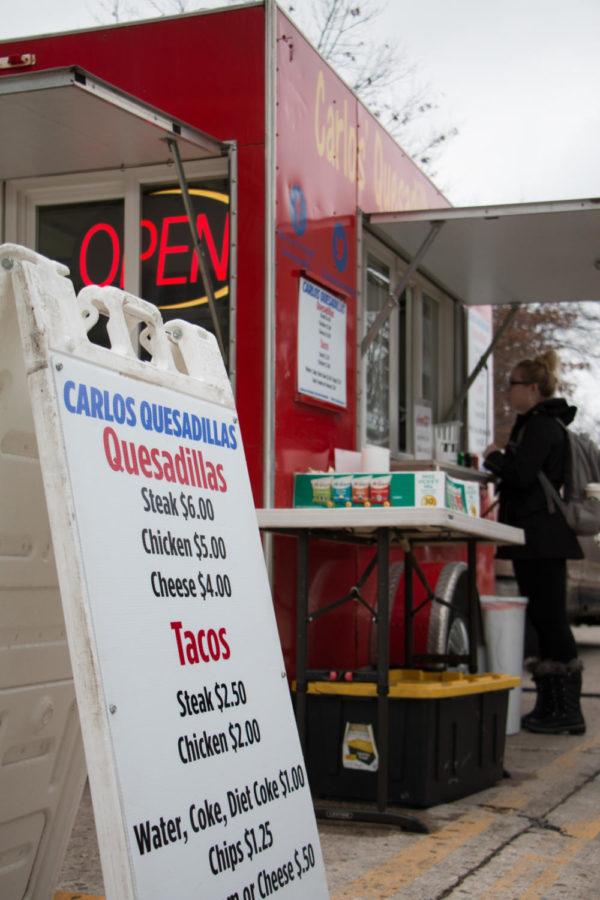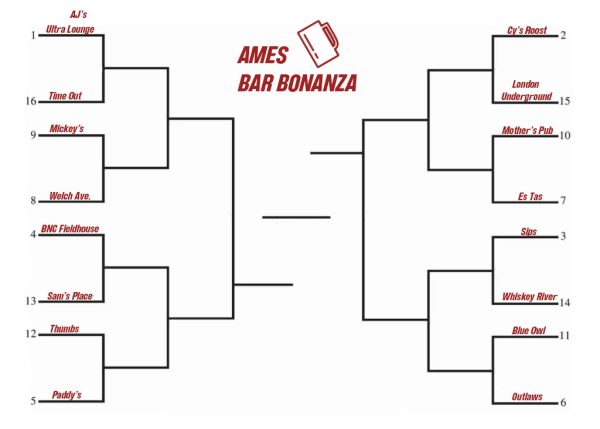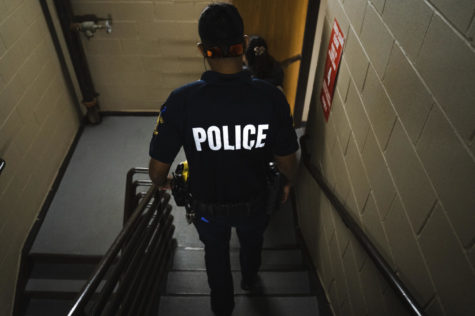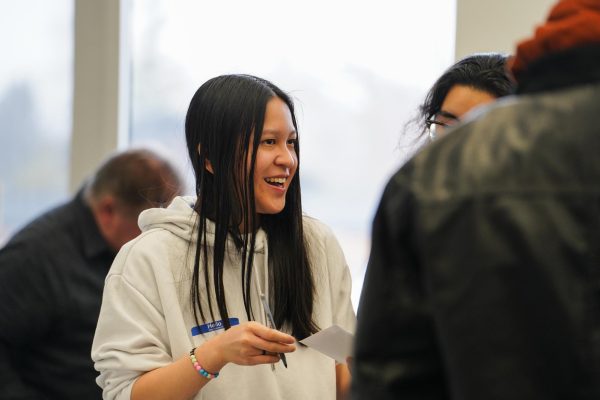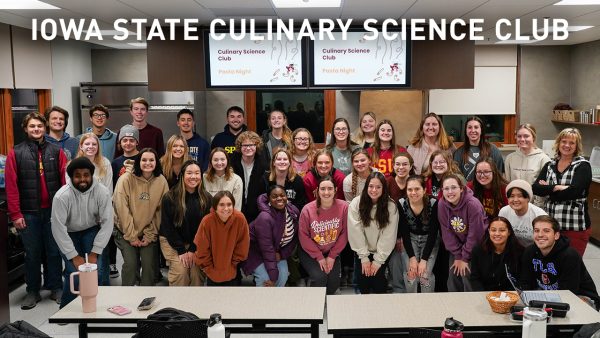Carlos’ Quesadillas: Only the beginning
November 23, 2015
A food truck pulled into the lot between Kildee and Lagomarcino halls, joining the Carlos’ Quesadillas truck, which was already there.
The competitor waved to Carlos Cortez, owner of Carlos Quesadillas, and yelled, “Hey, Carlos.”
“Hey, man. How are you?” Cortez smiled and waved back to his competition. Rain poured and pooled into small puddles as Cortez put up a tent to shield his customers, all the while never losing his smile.
The rain wasn’t going to stop his business, of course, so he had to be prepared. At this point, Cortez was prepared for anything.
Cortez moved to the United States from Mexico 13 years ago in search of better opportunities.
“I was making $5, $6 a day working 12 hours a day, six days a week,” Cortez said. “You cannot live with that money, you know?”
He landed in Iowa because he already had family in the state.
“I like it here now. It’s quiet,” he said. “There’s not a lot of crime. You come from another country, you see a lot of crime, you see a lot of stuff. Here it’s like seriously nothing. It’s so calm.
“One time in Mexico, someone put a gun to my head to steal $20. You don’t see that much here. It’s not like Mexico’s crime. You cannot go anywhere [in Mexico] and wear like rings, a watch or earrings or anything like that because you have to watch yourself all the time.”
To make ends meet in a new country, Cortez took up a job in a restaurant without knowing the language.
“I filled out this application, I went to the restaurant, and it was funny because everything they asked me I just said, ‘Yes, yes.’ I had no idea what I was saying, so I got hired,” Cortez said. “I learned quick [sic] I think … I honestly don’t remember my first year or six months waiting tables. I’m sure it was awful but I learned, you know, and it makes me proud.”
He started doing to-go orders and answering the phones then moved to serving customers as a waiter. Cortez said learning the language was one of the hardest things about moving to a new country.
After learning the language well enough to communicate easily and working for 10 years in the restaurant industry, Cortez decided he was ready for a change, which is what led him to the food truck he now owns.
Cortez said he was tired of being an employee and wanted to be his own boss with his own business.
“The food truck business is growing in the last five years,” he said. “… I thought it was going to be easier at first, you know. I’ll get a food truck, but I didn’t have a food truck when I started. I started with a push cart. At first, I thought it was going to be easy, ‘Oh this’ll be easy money,’ but I realized right away it wasn’t that way.”
Cortez started with a food cart and selling near the bars on Welch Avenue. He sold only five quesadillas a night for the first few months.
“You either give up or you keep going, and I choose to continue,” Cortez said. ” … No one’s going to give you anything just because.”
Customers started spreading the news that “there was a guy on Welch selling quesadillas,” and business started to take off for Cortez. He applied to be a food vendor on campus after he drove through campus and saw one other food truck, and, after eight months, he got the OK from the university.
He initially started selling out of his food cart, like he was on Welch at night. However, November and December were slow months because of the rain and snow, which is when he decided to invest in a food trailer.
“You can’t work with a push cart when it’s raining, so I decided to save some money and invest in a food trailer,” he said. “I painted [the trailer] and put everything inside, so, since March, I’ve been here pretty much every day, even in the summer when no one was here. I was still here.”
But having all the right materials doesn’t mean a business will work right away. He started his own business from the ground up without any help. Cortez said it’s the hardest thing he’s ever had to do, but he’s learning quickly.
“You think you’re ready, but then you realize, ‘Oh, I forgot this, oh, how do I do this?’ and things like that,” he said. “It took me a little over a year to figure out how to do it. Every night, you go to the computer and search stuff. I mean it’s hard, you don’t know any requirements.”
This is Cortez’s second year operating on campus, and he says he’s starting to figure everything out now.
“Things are going smoother, people are starting to know we are here,” Cortez said. “We have figured out how to make food really fast and people don’t have to wait. So the last couple months, I’m like, ‘OK, I think I made it’ or I see people waiting for the food, and it makes me happy.”
Without outside help or business experience, Cortez credits his time in the restaurant industry for developing the skills he needed to start Carlos Quesadillas.
“I think being a server has helped me a lot to understand the customer service,” he said. “You have to always be nice to the people, polite. You can have good food but bad customer service. And what are you going to have then? A bad experience. If the first thing that comes to your mind is bad experience, if someone makes you mad, you won’t want to go back there.”
His time in the service industry wasn’t easy, however. His 10 years were spent trying to learn the language, which he says he still gets nervous talking to people because of his “thick accent.” However, he says he has hardly faced any discrimination and can only think of a few times when he has.
Cortez was waiting on two men, one of whom owned a car dealership, at a Ankeny restaurant Cortez worked at six or seven years ago.
“I greeted these two guys, and one guy was like, ‘What? Are you speaking Chinese or what?,’” Cortez said. “Money doesn’t make you smarter than another person, you can have a lot of money and be ignorant like that. There is no reason to discriminate against people, that’s just stupid, I think.
“They don’t know the language, but that doesn’t make anyone stupid. It’s just some people don’t know the language, like how you don’t know German, you don’t know Spanish. But it doesn’t make you stupid. You have strengths in other areas.”
Cortez’s time as a server not only taught him the English language and how to take care of customers but also how to fix a problem when it comes to customers.
“You cannot argue with the customer, even if they are wrong,” Cortez said. “You just apologize and fix it. ‘How can I fix this? It’s my mistake, sorry.’ You know, always take responsibility even if they’re wrong. Nobody wants to be wrong, so you just apologize and try to make them happy the best you can.”
Luke Mikhail, junior in marketing and supply chain management, works for Cortez on Mondays, Wednesdays and Fridays and agrees with Cortez.
“As a businessperson, you should always be as nice to people as possible, and that’s how you get business,” Mikhail said. “I don’t put myself first, I put the customer first.
“If I have a bad experience while I was here, I wouldn’t necessarily come back. So I always try to be as happy as possible in all situations, no matter if I’m having a bad day, or I took a test right before that I failed. That’s how I do it, I put the customers first and go from there.”
Cortez and Mikhail work as a team making tacos and quesadillas throughout the week. They make their shifts pass quicker by entertaining each other.
“One day, [Cortez] goes, ‘Hey, I bet this is what this girl gets,’ and he gets it exactly right,” Mikhail said. “We kind of play games like that, too, to have some fun. My favorite part is the relaxed atmosphere — you can joke around and have a good time while still getting your work done.”
Mikhail said that Cortez and Carlos Quesadillas has helped him gain experience for his major.
“I help him out with some of the marketing we do,” Mikhail said. “We sometimes run Facebook things or contests or Twitter contests — you retweet this, you might get this. We also do punch cards. If you buy 10 quesadillas, you get one free, or if you buy 10 tacos, you get two free … I think the skills I learn here definitely could help me in the future.”
Aside from the customer interaction and the experience he gains, Mikhail also genuinely enjoys working with Cortez.
“He’s such a nice guy,” Mikhail said. “He always puts his employees first, and he always puts his customers first. He wants to make sure that we are in a great work environment, he wants to make sure that his customers are always getting good food. He wants to make sure he gets it right. He wants people to be coming back, and he wants loyalty, and I think that’s what he’s got.”
Cortez’s employees are not the only ones who notice his demeanor.
Caleb Ploeger, junior in business, has followed Carlos from Welch to campus.
“He’s friendly and professional,” Ploeger said. “I would say his service added to the quality of eating there. [His quesadillas] taste delicious and [are] not nearly as greasy as the other Welch food. I’ve never regretted a single purchase.”
Cortez takes his business one day at a time and relies on customers’ word of mouth to promote business.
“There’s 36,000 students. If I have 1 percent, that’s 360 students,” Cortez said. “One percent every day, I’ll be happy. Sometimes I have like half a percent, so that’s 150 people, but I’m happy with 150 people. I want to have more, you know, but what I’m saying is there’s 35,000 more.”
Cortez also has regular customers he sees two or three times a week and some regulars who have graduated, which he says is a hard part about the business.
“It’s sad when you see a customer every week, every week, and you build a relationship with [them, and] when you see people leave and graduate, it’s good for them, but you know we’re going to miss you.”
Cortez plans on keeping his food truck in service as long as possible, and he wants to open his own restaurant in the future.
“I love talking to people,” Cortez said. “I love the interaction with people.”
But for now, he wants to be as successful with Carlos Quesadillas as he can, and he plans to continue giving great customer service with his infectious smile.
“You want to give the same customer service to everybody no matter who they are,” Cortez said. “[Customers] feel important, and everyone wants to feel important.”
Cortez operates Carlos Quesadillas from 11 a.m. to 2 p.m. every weekday in the parking lot between Kildee Hall and Lagomarcino Hall.

